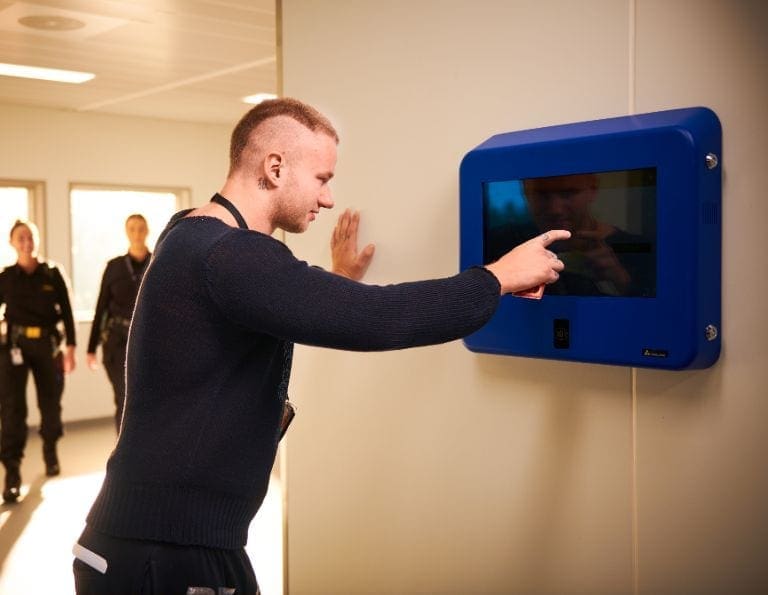(Prisoner SM, HMP Northumberland, operated by Sodexo on behalf of the UK Ministry of Justice, April 2017)
When I moved to HMP Northumberland I was so happy to see a Unilink kiosk. In my previous prisons friends spoke of how the kiosks made everything so much easier and reduced frustration and anger. And they weren’t wrong; I could see people taking charge of their lives, of having real-time information in front of them showing them their money, their work allocations, their visits and so forth. It was like going from the information blackout that is every other prison where things happen randomly and you never know from one minute to the next what is going on, to a place where you felt like you mattered. Your whole week was laid out in the kiosk diary; you could confirm your wages had been properly paid, you could see the names of the three people booked in for a visit next Thursday.
The contrast between a prison with and without kiosks is like night and day. Much is made of how prison makes a man better, but really prison will do it’s best to institutionalise a man; make the man dependent of the prison for everything, food, work, money, fresh air, library books etc. etc. and more importantly, information. It’s hard to have a sense of self-worth when you have no idea of what’s happening when, have no ability to try and manage anything and there are bits of paper continuously lost and stuck in the system. After a while it can be dehumanising fighting such a huge uncaring paper swallowing machine that rarely if randomly spits out a result that is probably different from that requested.
So imagine a kiosk, where right there all the vital information is laid out in front of you; right there, and then you can push buttons to organize visits, family visits, job applications and so forth, and get confirmation there and then that the work has been actioned. It is like jumping from the 1860’s Pony Express to the 2017’s smartphone all in one giant leap. It is the sense of liberation and empowerment that restores a man’s pride and gives him hope he can get through his sentence and come out a better person, that there is hope. A kiosk is only a small thing, the nights are still long and the cells claustrophobic, but at least it means the prison administration works efficiently.
Aside from reducing prisoner’s frustration and therefore self-harm and violence, the kiosks also benefit the prison in that there is mundane admin work to be performed behind the scenes by OSG so front line prison officers spend less time listening to prisoners asking for help then ringing admin offices to try and resolve prisoner’s issues. So deploying a kiosk system saves a prison Governor’s money and allows prison staff to concentrate their valuable time on rehabilitation and not administration.
Another benefit for Governors is that they themselves often operate in an information vacuum, not knowing what is happening at the coalface of the prison. Yet it is this coalface that makes the difference between a failing and a successful prison. The kiosk as deployed at HMP Northumberland made great use of the survey function – this allows the prison to build a short or long survey asking all 1100 prisoners their opinion on how the prison is doing and where problems lie. During my time Sodexo asked us about gym provision, education provision, the quality of food, how safe we felt in prison and other such consultation exercises. Just being asked these questions, being able to respond and feeling our voices were listened to increased prisoners sense of self-worth. Surveys are massive way of minimising the insidious effects of institutionalization.
Prisoners are expected to emerge from prisons rehabilitated and ready to be a productive member of society in terms of work, housing, family, finance and personal skills. In a time of austerity and record prison population electronic services, delivered via kiosks whether in-cell or not, can be a massive force-multiplier in the Prison Governor’s armoury.
Share







